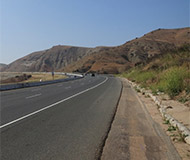6/30/2021
California: Grand Jury Report Labels Toll Roads A Bad DealReport from Orange County, California Grand Jury says tolling turned a $2.8 billion road into a $28 billion burden for drivers.

By Richard Diamond
Spending $28 billion to finance $2.8 billion in road construction costs makes no sense. That was the conclusion the Orange County Grand Jury arrived at last week after investigating California's Transportation Corridor Agencies (TCA), operators of the SR-73, 133, 241 and 261 toll roads. This is the second scathing grand jury report on the topic, following a 2020 investigation that was cut short by the Covid-19 virus scare (read 2020 report).
The grand jury is a group of about two dozen individuals who serve for a year with both criminal trial duties and the ability to investigate county business. Jurors gathered documents and conducted interviews to lay out the history and operational practices of the private-public partnership behind the toll roads.
California created the "joint power agreements" that allowed area cities in 1986 to set up two separate toll road agencies (collectively, the TCA) governed by boards consisting of city officials and county supervisors. TCA sold non-recourse revenue bonds to private investors to raise money for the road with the expectation that future toll revenue would be used to pay them back. TCA also levies an "impact fee" tax on developers near the road to generate revenue, which will add $16,434 to the cost of each new house in the area by 2050. TCA spent $2.5 billion of this money to construct the 51 miles of highway that exist today. TCA also used another $197 million that came in the form of federal grants -- the only direct investment from taxpayers.
After the last construction bond was issued in 1999, the publicly stated plan was to retire the debt and turn the toll roads into freeways by 2040. Debt was structured in ways that backloaded payment as far as possible, like a balloon mortgage.
"Tolls pay for construction debt only under a liberal interpretation of the concept," the report explained. "The initial three-billion-dollar debt was converted into more debt and then more debt, resulting in a $15 billion financial hole. A toll dollar dropped into that hole has a one in five chance of landing on the original construction debt. The correlation between construction debt and toll revenues is effectively broken."
Traffic forecasts proved optimistic, and the Great Recession hit in 2007, forcing TCA to restructure its debt, further putting off repayment until 2053.
"The new financial strategy bought the TCA some breathing room, so it amended the forecasted revenues to lower, more realistic numbers," the report noted. "This financial maneuver also extended its life as an agency. As long as the TCA has outstanding debt, it can stay in business, collect tolls from drivers, and collect development impact fees from builders."
From the opening of each toll road until 2020, motorists have paid $5 billion in tolls, and the buyers of new homes have paid $757 million, for a total of $6.1 billion in revenue (including additional cash from miscellaneous sources). The report projects the total will grow to $21 billion in toll collections by 2053, plus $861 million in developer fees for a total collection of $28.2 billion. Even though original construction costs were $2.8 billion, the total amount spent servicing the debt has been $5.4 billion to date and will rise to $15.7 billion by 2023.
Fitch Ratings believes TCA will be able to pay that debt because, "Legal rate-setting flexibility is high, as the agency can raise rates to any level without voter or regulatory approval." There is, however, no legal requirement for paying off the bond debt. Instead, TCA has 65 full-time staff with generous pensions and benefits from the state of California who would not want to give up the job security.
"Regardless of when the debt is retired, the grand jury believes that the roads will never become free," the report concluded. "With annual revenue of $400 million and rising, the TCA is viewed as a 'cash cow,' as one local official described it to the grand jury."
To justify the agency's ongoing existence, toll road funds are now being used to pay for projects that have nothing to do with the road, including building bicycle lanes. TCA has also spent $14 million on marketing, $10.6 million on "outreach" and $8.3 million on political lobbying.
"One agency insider stated to the grand jury that the TCA's only real supporters are people and groups that directly receive TCA money," the report explained. "The grand jury believes that the county would be better served if the agency devoted its funds to paying off debt."
A copy of the report is available in a 5mb PDF file at the source link below.


